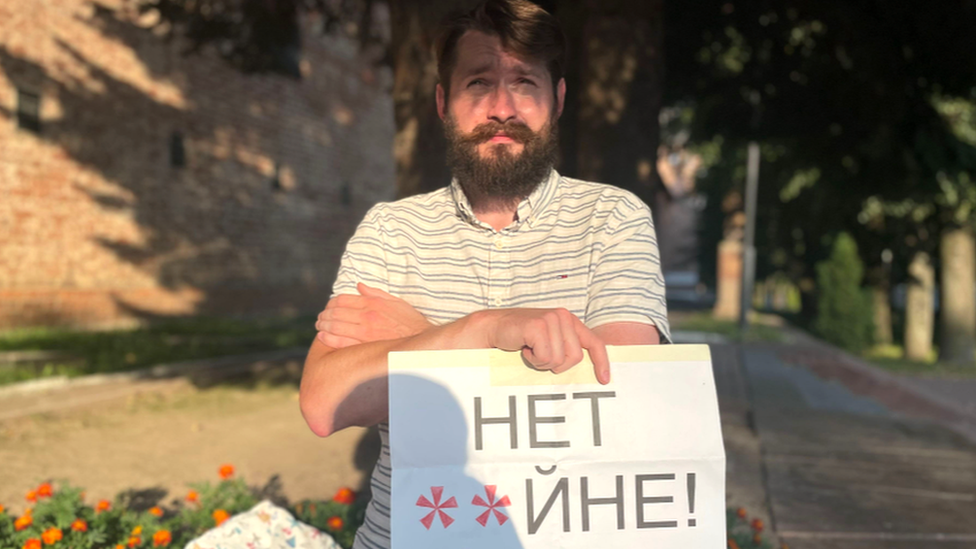Ukraine war: Russians stage plasticine protests to oppose war
- Published
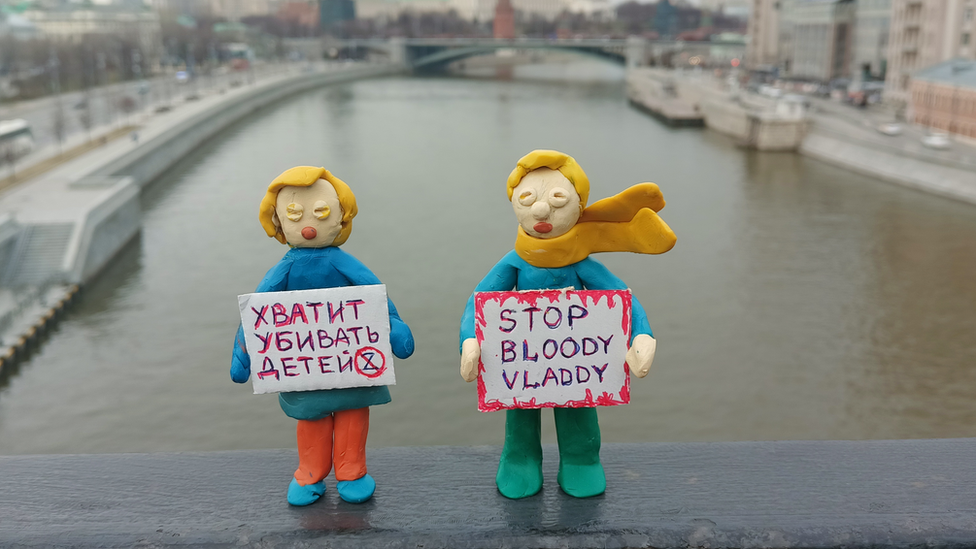
Two figurines, with one saying "stop killing children", photographed near the Kremlin
On the day Russia invaded Ukraine, Yevgeny went to an anti-war rally in St Petersburg. There he watched as demonstrators were brutally beaten and arrested, and knew that overt dissent was all but impossible.
As the war intensified, the artist found another way to make his objections heard: a project he called "malenkiy piket", or "little picket".
He made miniature figures out of plasticine, placed banners in their hands, took pictures of them "protesting" in locations around the city, and posted the results to Instagram with an invite for others to join the movement.
It was a risky pursuit. Were he to be caught, he could face up to 10 years in prison under a new law against anti-war protests.
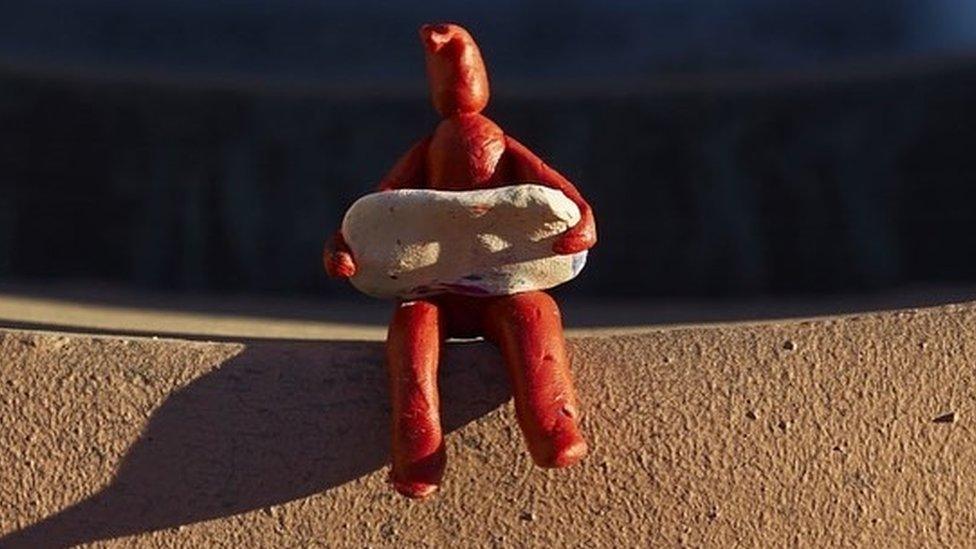
The first figure made by Yevgeny
But he would not be silent. "We were a gang, me and my little people. Afterwards I felt like I did something, like I wasn't completely useless," he told BBC Russian.
Soon enough, hundreds of Russians started sending him photos of their own little protesters from cities all over the country, adding to growing underground dissent against the war.
But the state hit back. Last March Sasha Skochilenko, another artist from St Petersburg, was charged with spreading "fake news" after swapping price tags in shops for leaflets about Russia's devastation of the city of Mariupol.
She was reported by a pensioner, arrested and now faces 10 years in prison. Her trial is ongoing.
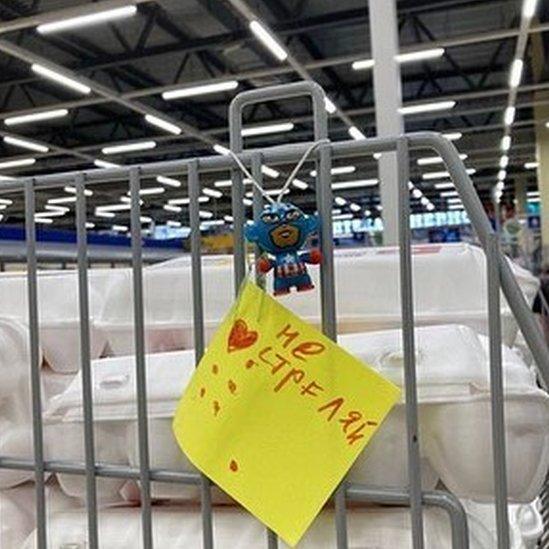
A child's toy with the message "don't shoot"
A month later, a married couple placed a child's toy with a "don't shoot" sign in a St Petersburg shop. Staff used CCTV to identify them, leading to their arrest and a fine the equivalent of $320 (£250) for "spreading fake stories about the Russian army".
Yevgeny says they haven't sent photos since, but "they weren't put in prison, that's great".
Instagram and many other social media and news websites were blocked in Russia soon after the war started, but many Russians use private networks and encryption to get round the restrictions.
The setbacks did not stop the movement, and nor did more upheaval in Yevgeny's life. Nevertheless, the pressure on dissenters was unrelenting.
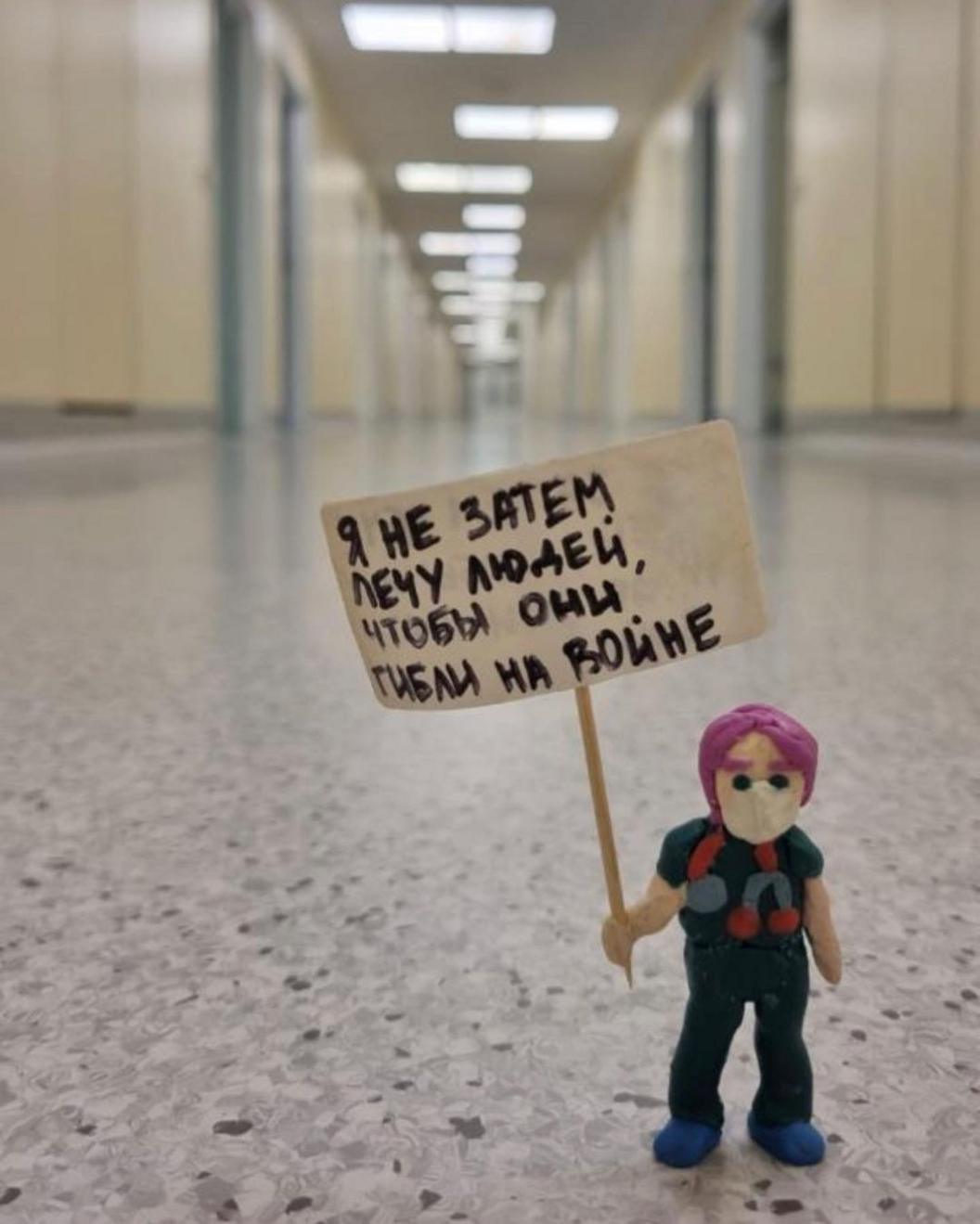
"I don’t want to cure people only for them to die in war"
"Repressions in Russia were accelerating, and I started fearing for my life, I got paranoid," says Yevgeny, who was now in charge of an illegal movement that could at any moment be exposed.
The artist was also putting himself in danger by calling his mother and brother, who lived near the Zaporizhzhia nuclear plant in Ukraine, and discussing the war with them.
In the meantime, his cousin joined the Russian army, went to fight in eastern Ukraine, and lost an arm in combat. "It was [like] a brother against brother situation," says Yevgeny.
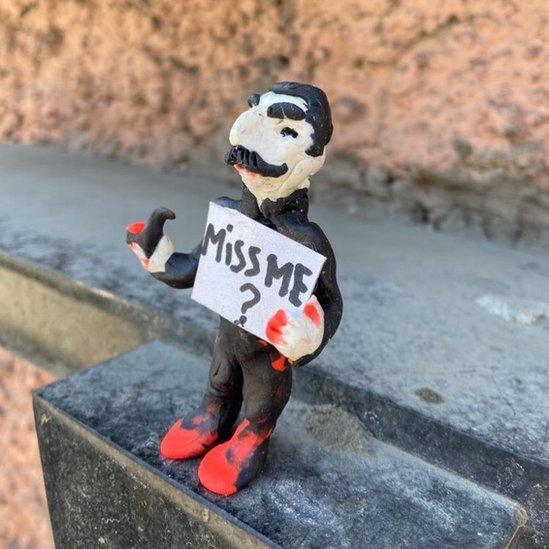
Plasticine figure of Josef Stalin left at a monument to one of his victims
In September, Vladimir Putin announced a partial mobilisation of Russian men and Yevgeny, who had previously joked with friends about having a "lad's holiday" abroad to get away, decided it was indeed time to go.
He called a taxi, crossed the border into another country, and never returned to Russia. A few weeks later his neighbour received draft papers in his name.
Meanwhile the "little picket" community reacted strongly to the mobilisation order, and Yevgeny was flooded with pictures of new little protests.
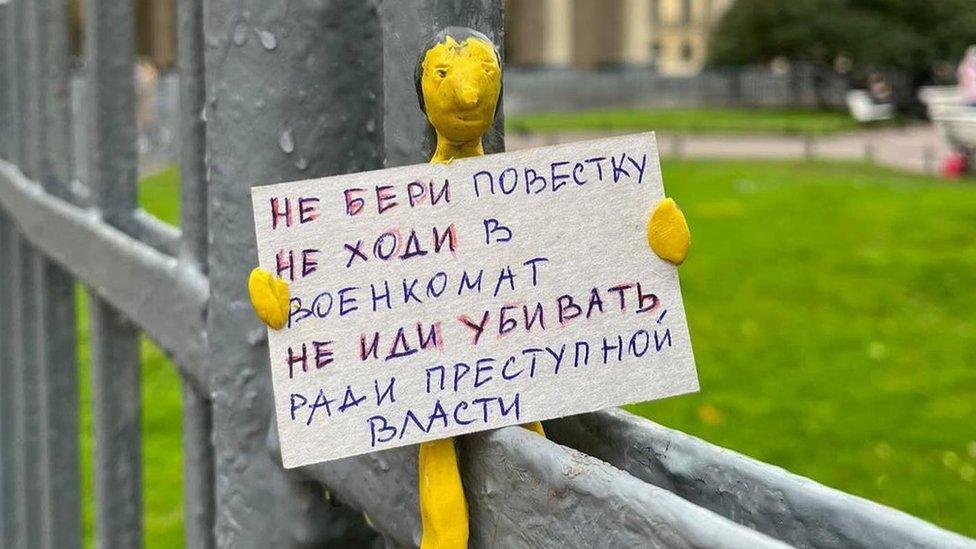
A figure in St Petersburg protesting the mobilisation, including the words "don't go to kill for the sake of a criminal regime"
His "holiday" became indefinite and he is now living in a former Soviet country. He had to sell his flat in St Petersburg to keep afloat.
But his protest movement keeps him connected to Russia. People still send him their pictures and he still posts them on Instagram.
"If I am not in Russia, if I am not thinking about Russian culture and Russia's future, what's the point?" he says. "My plan for the future is to decide how to remain a human being."
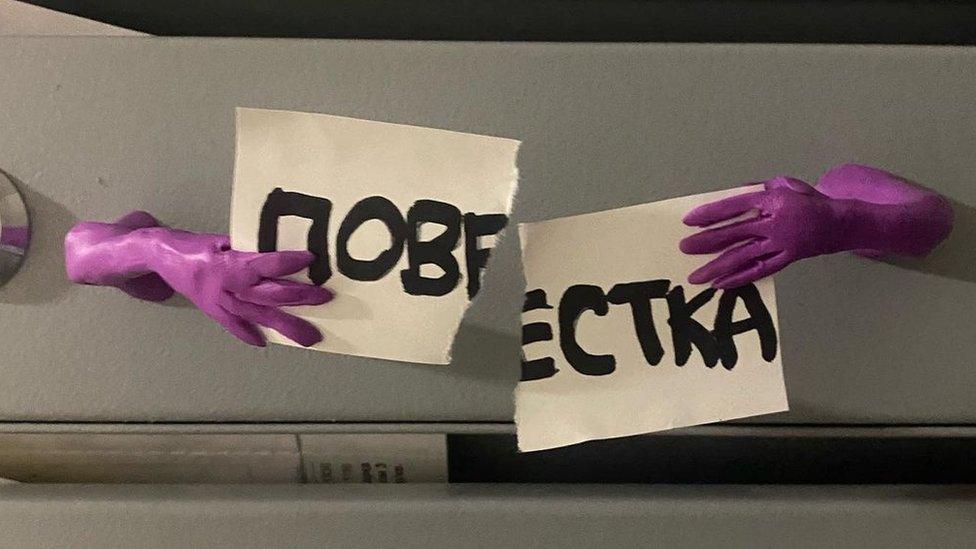
The word "draft notice" being torn up in a letterbox
He is, however, worried about the safety of contributors, regularly warning them to be careful.
He advises them on the riskiest places to stage protests: there are too many witnesses in churches, too many cameras in shops and both are problems at monuments and landmarks.
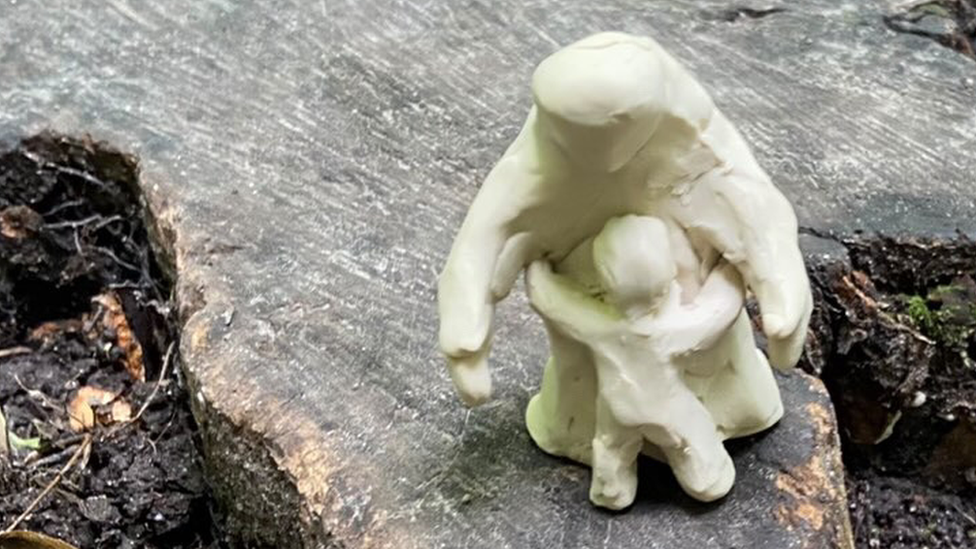
The plasticine figures keep coming even after Yevgeny fled Russia
Ukrainians who have seen the page on Instagram are not particularly impressed: Plasticine will not stop bombs.
Yevgeny understands, but thinks that "malenkiy piket" helps with one important question many Russians have: "What can I do?"
"I can do something every day. Yes, it's only a small act, but here on the feed it's going to look big. It's an attempt to find a way to be united in this common pain," he says. "This is necessary because [protest] is impossible."
You can listen to Yevgeny's interview with BBC Russian here (in Russian), external
Related topics
- Published22 September 2022
